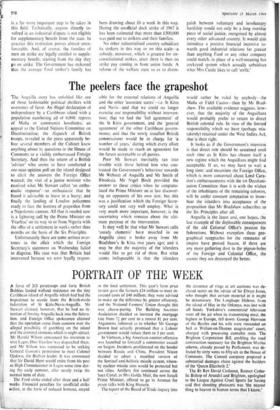The peelers face the grapeshot
The Anguilla story has unfolded like one of those fashionable political thrillers with overtones of farce. An illegal declaration of independence by a Caribbean island with a population numbering all of 6,000: reports of Mafia or communist hoodlums; an appeal to the United Nations Committee on Decolonisation; the dispatch of British troops, revealed in the press apparently be- fore several members of the Cabinet knew anything about it; questions in the House of Commons to a visibly embarrassed Foreign Secretary. And then the return of a British `adviser' who seems to have conducted a one-man opinion poll on the island designed to elicit the answers the Foreign Office wanted; the visit of a junior minister who received what Mr Stewart called an enthu- siastic response'—so enthusiastic that he found it advisable to leave in a hurry; and finally the landing of London policemen ready to face the horrors of grapeshot from a Napoleonic cannon. All that is needed now is a lightning call by the Prime Minister on `Fearless' on its way to or from Nigeria with the offer of a settlement in weeks rather than months on the basis of the Six Principles.
Unfortunately there are some serious over- ' tones to the affair which the Foreign Secretary's statement on Wednesday failed to disperse. His case was that Britain had intervened because we were legally respon- sible for the external relations of Anguilla and the other 'associate states'—i.e. St Kitts and Nevis—and that we could no longer exercise our responsibility without interven- tion; that we had the 'full agreement' of the St Kitts government, and the 'general agreement' of the other Caribbean govern- ments; and that the newly installed British commissioner would be in charge for 'a number of years,' during which every effort would be made to reach an agreement for the future acceptable to all parties.
Poor Mr Stewart inevitably ran into trouble with those behind him who con- trasted the Government's behaviour towards Mr Webster of Anguilla and Mr Smith of Rhodesia. Mr Nigel Birch provided the answer to these critics when he congratu- lated the Prime Minister on at last discover- ing an opponent of his own size; but this was a justification which the Foreign Secre- tary could not very well employ. What is very much more important, however, is the uncertainty which remains about the ulti- mate purpose of the intervention.
It may well be that what Mr Stewart calls 'unruly elements' have muscled in on Anguilla since it broke away from Mr Bradshaw's St Kitts two years ago; and it may be that the majority of the islanders would like to get rid of them. But what seems indisputable is that the islanders would rather be ruled by anybody—the Mafia or Fidel Castro—than by Mr Brad- shaw. The available evidence suggests, how- ever, that the majority of the Anguillans would probably prefer to return to direct British colonial rule. In view of the limited responsibility which we have (perhaps mis- takenly) retained under the West Indies Act, that is their right.
It looks as if the Government's intention is that direct rule should be sustained until such time as St Kitts has chosen itself a new regime which the Anguillans might find ,acceptable. If so, we may have to wait a long time; and meantime the Foreign Office, which is more concerned about Lord Cara- don's embarrassments with the UN Decoloni- sation Committee than it is with the wishes of the inhabitants of the remaining colonies, will be under constant temptation to brow- beat the islanders into acceptance of the proposition that Mr Bradshaw subscribes to the Six Principles after all.
Anguilla is the latest and, one hopes, the last example of the deplorable consequences of the old Colonial Office's passion for federations. Without exception these geo- graphical receptacles for the remnants of empire have proved fiascos. If there are any more gathering dust in the pigeon-holes of the Foreign and Colonial Office, the sooner they are destroyed the better.










































 Previous page
Previous page